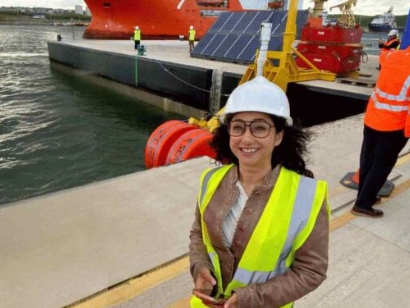
Led by CEO Ash Penley, ZOEX is the UK’s only female-founded wave energy company, having raised over £1 million in combined public and private funding. The company’s wave energy converter features a patent-pending double-Link arm mechanism, designed to harness energy from oceans with lower wave heights. The system incorporates survivability features, including impact-resistant floats, a submerged survival mode, and no mechanical end stops, ensuring durability and efficiency.
The technology is versatile, with potential applications in sectors such as aquaculture, offshore wind, oil and gas, and remote ports and harbors. A 100kW full-scale prototype was tested in Aberdeen Harbour in 2024 and is now set to undergo further testing in Ordu, Turkey, at a site provided by OREN Energi A.S., a renewable energy subsidiary of Ordu Municipality. This location offers critical met-ocean data for assessing the technology’s performance. ZOEX aims to achieve commercial deployment by the end of 2025.
“This investment is a huge step forward for ZOEX and for women in marine energy,” said Ash Penley. “Our technology has been designed not just to survive at sea, but to thrive efficiently, sustainably, and at scale. We’re grateful for the latest backing from Equity Gap, Scottish Enterprise, and the University of Strathclyde, who share our vision for a cleaner, more resilient energy future.”
Fraser Lusty, managing director of Equity Gap, stated: “At Equity Gap, we’re focused on backing bold innovation and exceptional founders. ZOEX ticks both boxes. Ash has built a solution with global potential, and we’re proud to play a part in helping this technology reach the market.”
ZOEX is supported by Glasgow-based Malin Group and Applied Renewables Research Ltd, which provide wave energy modeling and commissioning expertise. The system is engineered for short-term economic returns while targeting long-term grid-scale deployment. The company is poised to contribute to the expanding wave energy market, projected to grow from $1.3 billion in 2024 to $19.8 billion by 2032.